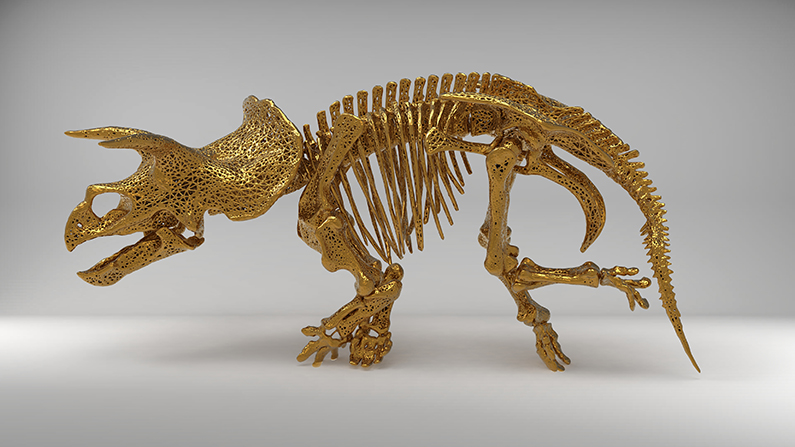
Artist Amy Karle – one of the most influential women in the 3D printing industry today and one of the BBC’s 100 Women – wants to introduce us all to an old friend of hers named “Hatcher,” a 66-million-year-old Triceratops skeleton in the National Museum of Natural History who made history as the first “digital dinosaur”.
The introduction across the ages was made possible with the aid of HP’s 3D Printing & Digital Manufacturing organization and HP Labs. Karle used 3D scan data of a fossilized Triceratops skeleton from the Smithsonian Digitization Office as the foundation for a series of artwork, each intended to imagine novel forms based upon extinct species to explore “hypothetical evolutions through technological regeneration.”
The resulting work – Morphologies of Resurrection – is represented in six finely detailed skeletal sculptures. Displayed under glass, the collection evokes the golden era of natural history museums (and perhaps the age of cabinets of curiosities), “specimens and relics” investigating the relationship between structures that once served creatures of eons past for the purpose of finding application for future forms using their framework of stability, flexibility, and strength.

Karle brought to life her menagerie of explorative 3D printed morphologies using HP Jet Fusion 5200 and 580 printing systems.
I love the exploration and development that 3D printing offers: a new opportunity for thinking, a new way to reshape what we create, and a completely new approach to expression in which digital, physical and biological systems are interwoven. HP 3D Printing enables me to bring this vision to life by opening up new artistic possibilities not achievable before.
Additionally, Karle created three other 3D sculptures from biocompatible polyamide, a trio of cast sculptures of Hatcher conceived in various forms finely detailed in cellular and scaffold patterns, each uniquely painted in gold, copper, and silver iterations. As such, one can consider Karle’s sculptures of Deep Time and The Far Future as Triceratops v2.0.
This article was first featured at https://ift.tt/39Ks1ne on April 6, 2020 at 11:02AM by Gregory Han













More Stories
Can this possibly be true? “Metal 3D printing is now possible on any 3D printer…with the right settings and a few minor upgrades like a hardened steel nozzle…” – July 2 2023 at 04:59PM
New NASA Funding Ignites 25 3D Printing Projects in Space Exploration – June 18 2023 at 04:34PM
Nvidia AI produces 3D models from 2D videos 3D printing applications forthcoming? – June 15 2023 at 02:55AM